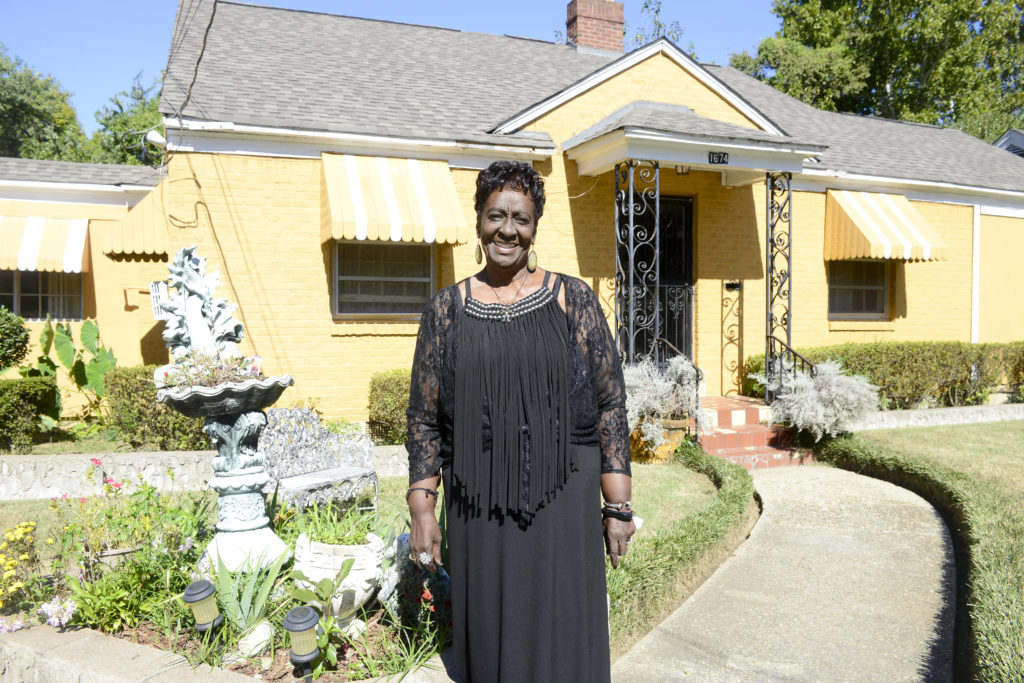
Helping Seniors Age in Place
Helping Seniors Age in Place
In Shelby County, Tennessee, seniors receive financial help to make needed home repairs.
Rubye Dunn has lived in her Memphis, Tennessee, home for 50 years. She’s worked, paid her taxes and has contributed to her community. But at the age of 76, she found herself unable to afford necessary repairs and improvements to her home, which was becoming less and less livable over time. Her utilities were rising; her roof needed repair.
Ms. Dunn is not alone. As America’s baby boomers age, America’s elder population is in a period of unprecedented growth. Because Tennessee is home to a significant number of these boomers, our state is adjusting to the changing needs of this demographic, and housing has been identified as one of the areas where immediate help is needed.
In 2012, the Plough Foundation commissioned the AdvantAge survey, which provided a close look at local citizens age 65 and older. The survey data showed 94 percent of seniors in Shelby County want to stay in their homes as long as possible, but that 23 percent needed accommodations for easier access getting into or around their homes and 48 percent needed bathroom safety modifications related to mobility. And among lower-income elders who stated that they need modifications:
- 64 percent needed major structural repairs, such as plumbing or roof repairs,
- 43 percent needed cooling assistance, and
- 35 percent needed heating repairs.
Diane Rudner, Chairman of the Board of Trustees for the Plough Foundation, cites mobility and accessibility as a key concern for older adults. Rudner said, “In our community, there is a significant need for home maintenance, repair assistance and home modification to help older adults avoid accidents, welcome visitors and access community activities. Improving mobility and accessibility will allow us to meet the need most frequently mentioned by our area’s older adults: the need to continue to play a meaningful role in their family, neighborhood and community.”
A survey of seniors in Shelby County, Tennessee, found that among those not planning to make needed home modifications, the most common cited reason was “I can’t afford it.”
Local societal and governmental issues also provide important context to the narrative of need. Home repair funding in Shelby County, where we focus our work, has been cut dramatically in recent years, leading to more seniors going into tax-funded nursing homes prematurely. That cost to the community? $62,000 per year per senior. Abandoned homes that need repairs also contribute to neighborhood blight. From 2005 to 2009, the City of Memphis spent over $16 million combating fires in abandoned properties. Clearly, an initiative to help seniors age in place not only helps keep homes occupied; it also made good fiscal sense.
The potential for impact coupled with the incredible need made it clear that a significant investment was needed, and in November 2014, our board awarded a $3.9 million dollar grant to launch the Aging in Place Program, an unprecedented collaborative effort between Habitat for Humanity of Greater Memphis, Service Over Self and Memphis Light, Gas & Water. This program provides accessibility improvements, mobility modifications, weatherization enhancements and critical home repairs crucial to helping seniors live in their homes longer and retain their independence. The program serves low-income homeowners age 60 or older – or households with a senior residing full-time in the home – who are current on their taxes and mortgage.
To date, the Aging in Place Program has provided over 230 accessibility modifications, such as wheelchair ramps and grab bars; repaired over 180 roofs; and conducted over 200 safety interventions, such as patching holes in the floor, to prevent falls and other accidents.
Key initial findings demonstrate that the repair program is truly life-changing.
- 87 percent of clients saw reduced utility bills within 60 days. A quarter of those experienced savings of over $50. That’s equal to 60 days’ worth of senior vitamins, a bottle of arthritis medication and eight servings of a nutritional enhancement drink, with $10 remaining to purchase produce and household items.
- Almost 1 in 4 clients believe that without the program’s services, they would have had to leave their home. Out of that number, 31 percent would have to leave within the year; and 33 percent would have to move in the next two to three years. (It’s worth noting that 78 percent of our clients are neighborhood staples, living in their homes for 21 years or more.)
- 30 percent of our clients reported having a breathing condition, such as asthma, upon entering the program. A quarter of those now say their breathing has improved since receiving repairs.
When we launched Aging in Place, we didn’t fully understand how dire living conditions were for so many seniors. In fact, 10 percent of the homes we initially inspected were in such a state of disrepair that it was not financially feasible to repair them. We also had to adjust our original service number goals because so many of the homes needed new roofs, pest abatement, HVAC work and other costly critical repairs.
In response to those challenges, along with others discovered by construction staff upon visiting seniors’ homes, Habitat saw a need for a social worker to direct seniors to an extended network of services outside of our program’s expertise and scope. She has provided referrals, developed a resource manual for clients, churches and community centers, and served as the connection to wraparound services we did not initially foresee.
While Shelby County’s senior housing needs are great, we have discovered what starting the conversation and providing funding can achieve. The program’s benefits and return on initial investment have led to supplemental support from other organizations, including the Federal Home Loan Bank of Cincinnati, Memphis Area Association of Governments, the Tennessee Housing Development Agency and the City of Memphis Division of Housing and Community Development.

“There have been times when I couldn’t afford my medication because the utility bills were so high. These repairs have kept me warm and dry and have saved me on utility bills to the point where I could afford my medication. I’m the oldest person in my family, and I am so grateful to be able to stay at home and not worry about being sent somewhere because my home is in bad shape. I even get a little bit of a workout because I use my handrails! I went on a trip this past Christmas to New York with a friend, and it was life-changing to feel like I could [do] more things because my home isn’t my biggest worry anymore.” – Rubye Dunn, Aging in Place program client.
The Plough Foundation was established in 1960 by Abe Plough, who said, “You do the greatest good when you help the greatest number of people.” Today, thanks to the work of the Aging in Place collaborative, Rubye Dunn and hundreds of other Shelby County seniors feel safe and secure in their homes due to critical repairs, lighting improvements and accessibility modifications. They breathe easier because their homes are now free of pests and mildew. They get out more and do not worry about having to move. And they no longer have to choose between keeping the lights on or getting their medication.
The Plough Foundation recognizes there are many pressing social and economic issues facing Memphis and Shelby County. Our grantmaking reflects those needs as well as concentrates resources in areas of special interest, selected periodically by our Trustees. The story of our Aging in Place initiative tells the story of the need we are working to address – and highlights the remaining incontestable demand for resources for Shelby County’s senior population, many of whom are living on very limited incomes.
Here at The Plough Foundation, we embrace collaboration and discovery, and this Aging in Place initiative has certainly inspired both. Together, we can help change the lives of people like Ms. Dunn and the thousands more who still need our help.
Rick Masson is the Executive Director at The Plough Foundation in Memphis, Tenn.
Project
Aging in Place
Philanthropy
The Plough Foundation


